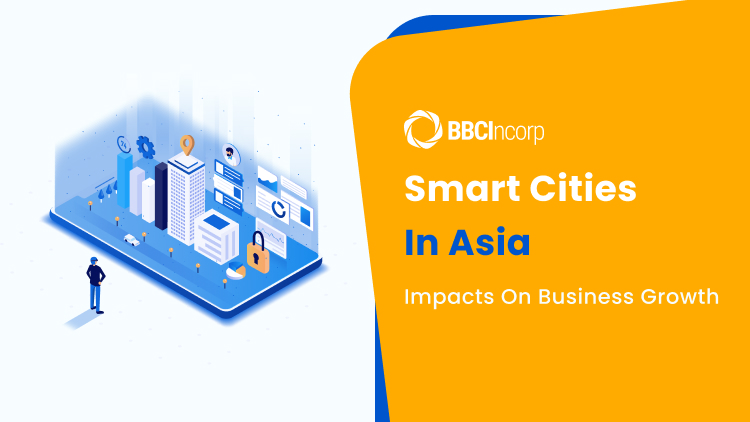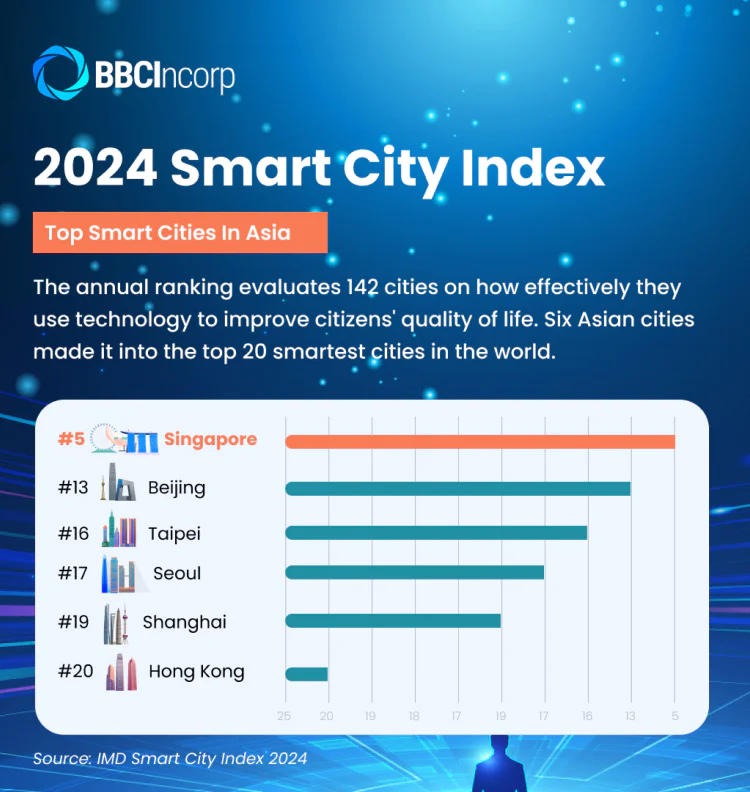
As urbanization accelerates across Asia, the concept of smart cities is transforming the way we live, work, and do business. By leveraging advanced technologies and data-driven solutions, smart cities are creating new avenues for expansion and innovation.
In this article, let’s explore how these advanced urban areas are shaping business opportunities and driving economic growth.
What are smart cities in Asia?
Smart cities in Asia are urban areas that use advanced technologies and data-driven solutions to enhance residents’ quality of life, streamline city operations, and boost economic growth.
According to IMD Smart City Index 2024, six Asian cities made it into the top 20 smartest cities in the world, with Singapore reigning at the top, followed by Beijing, Taipei, Seoul, Shanghai and Hong Kong.

There are 4 key criteria that define a smart city:
- Investment in advanced technology: The city invests in cutting-edge technology and infrastructure, such as autonomous vehicles, smart public transit, and high-speed internet, to improve operational efficiency.
- Digital governance: The city implements digital governance systems that provide easy online access to government services and welfare programs.
- Data-driven management: The city uses data analytics to monitor and manage urban activities like traffic, waste management, and public safety.
- Commitment to sustainability: The city actively pursues initiatives to reduce its carbon footprint and promote environmental sustainability.
Benefits of smart cities for business growth
A smart city embodies entrepreneurial spirit that are necessary for business innovation and growth. With the integration of technologies and systems, businesses can expect to reap significant advantages when expanding into smart cities in Asia.
Enhancing infrastructure and connectivity
One of the primary ways smart cities are driving business growth is through the enhancement of infrastructure and connectivity. By leveraging Internet of Things (IoT) and AI technologies, cities can optimize traffic management, reduce congestion, and improve public transportation systems.
For businesses, this means more efficient logistics and supply chain operations, reduced transportation costs, and improved productivity. Furthermore, seamless connectivity allows businesses to operate smoothly and enhances the ability to communicate and collaborate, both locally and globally.
Innovative ecosystems
Smart cities are often home to vibrant innovation ecosystems, including tech hubs, research institutions, and startup incubators. These ecosystems foster collaboration, creativity, and technological advancements, providing businesses with the resources they need to succeed.
For example, Singapore’s Smart Nation initiative that aims to create an environment where businesses and startups can develop and test new technologies. Additionally, Singapore Startup Grants provide funding and support for businesses aiming to innovate and expand, which make it an attractive destination for businesses seeking to tap into the Asian market.
Government support and incentives
Government support is one of the most important aspects of smart cities. Policies, incentives, and grants are often implemented to attract and support new businesses, creating a business-friendly environment that reduces bureaucratic hurdles and promotes economic growth.
Hong Kong, for instance, has introduced various initiatives designed to foster such an environment. The city’s government offers numerous incentives and grants to attract and support new businesses, making it an attractive destination for business expansion.
Case studies of businesses thriving in smart cities
In this section, let’s take a look at some real-life examples of businesses that have flourished in smart cities.
Grab in Singapore: Revolutionizing urban mobility
Singapore’s “Smart Nation” initiative has provided a fertile ground for innovative enterprises like Grab, a leading ride-hailing company in Southeast Asia.
Leveraging the city’s robust digital infrastructure and supportive regulatory framework, Grab has transformed urban mobility through its platform that offers ride-hailing, food delivery, and digital payment solutions.
By using real-time data analytics and AI, Grab optimizes routes, reduces wait times, and improves overall customer satisfaction. The company’s collaboration with local government agencies to launch initiatives like electric vehicle (EV) fleets underscores the symbiotic relationship between smart city projects and business innovation. As a result, Grab has significantly expanded its market share and service offerings, becoming a cornerstone of Singapore’s smart city ecosystem.
SenseTime in Hong Kong: Pioneering AI solutions
Hong Kong’s smart city blueprint emphasizes AI and big data as pivotal components for future growth. SenseTime, an AI technology firm headquartered in Hong Kong, stands out as a stellar example of how businesses can thrive in such an environment. Specializing in computer vision and deep learning, SenseTime provides AI-driven solutions for various sectors, including healthcare, finance, and retail.
The company’s success is bolstered by Hong Kong’s supportive policies, which include grants and incentives for tech startups. SenseTime’s research partnerships with local universities and its involvement in government-led AI projects have enabled it to push the boundaries of innovation. This synergy between public and private sectors has cemented SenseTime’s position as a global leader in AI technology, driving both local and international growth.
Naver in Seoul: Leading smart workplaces
Seoul’s smart city initiatives prioritize technological advancements and high-quality living standards, creating an ideal environment for tech companies like Naver. Known as South Korea’s largest search engine and a frontrunner in internet services, Naver has leveraged Seoul’s smart infrastructure to develop groundbreaking solutions for smart workplaces.
Naver’s AI-powered tools enhance productivity, streamline workflows, and foster remote collaboration, catering to the evolving needs of modern businesses. The company’s investment in smart office buildings equipped with IoT sensors and AI-driven facilities management systems showcases its commitment to innovation. This strategic alignment with Seoul’s smart city vision has solidified Naver’s status as a leader in digital transformation.
Have a business vision in mind? Let's turn it into reality!
Starting and growing a company in Asia smart cities with the help of BBCIncorp. Feel free to contact us via service@bbcincorp.com or chat with our support team for dedicated assistance.
Conclusion
Smart cities in Asia are redefining the landscape for business growth and expansion. From enhanced infrastructure and connectivity to robust innovation ecosystems and supportive government policies, these urban centers provide a fertile ground for businesses to flourish.
As more cities embrace smart technologies, the potential for economic growth and development continues to rise, positioning Asia as a leader in the global smart city movement.
For businesses looking to expand to smart cities, the benefits are clear. These cities are not just the future of urban living; they are the catalysts for today’s business growth, driving innovation, efficiency, and prosperity throughout the region.
Disclaimer: While BBCIncorp strives to make the information on this website as timely and accurate as possible, the information itself is for reference purposes only. You should not substitute the information provided in this article for competent legal advice. Feel free to contact BBCIncorp’s customer services for advice on your specific cases.
Industry News & Insights
Get helpful tips and info from our newsletter!
Stay in the know and be empowered with our strategic how-tos, resources, and guidelines.






